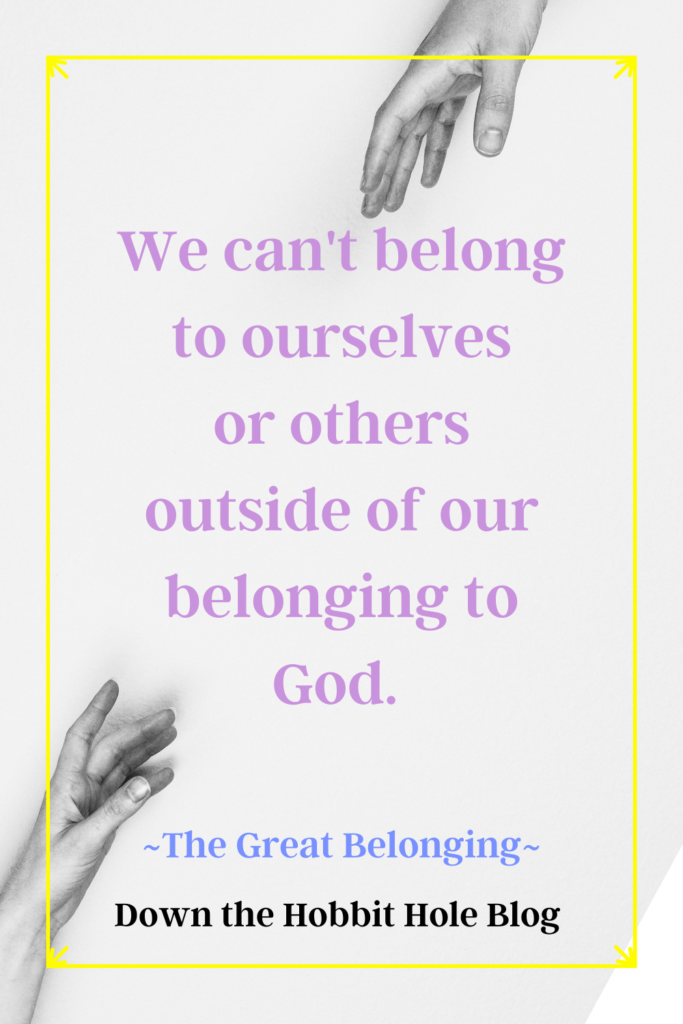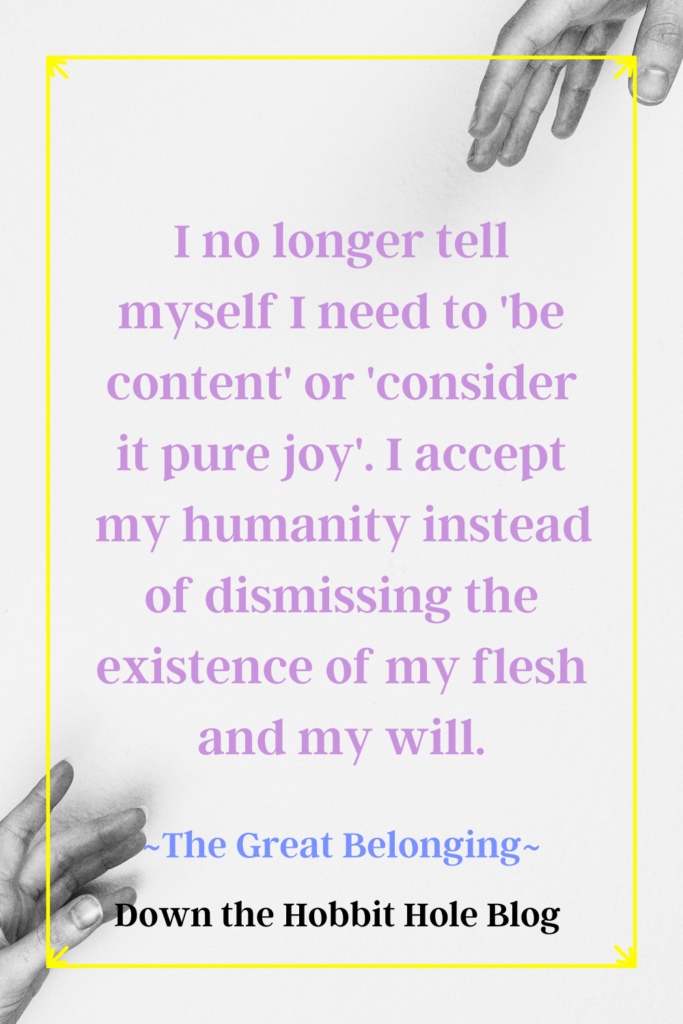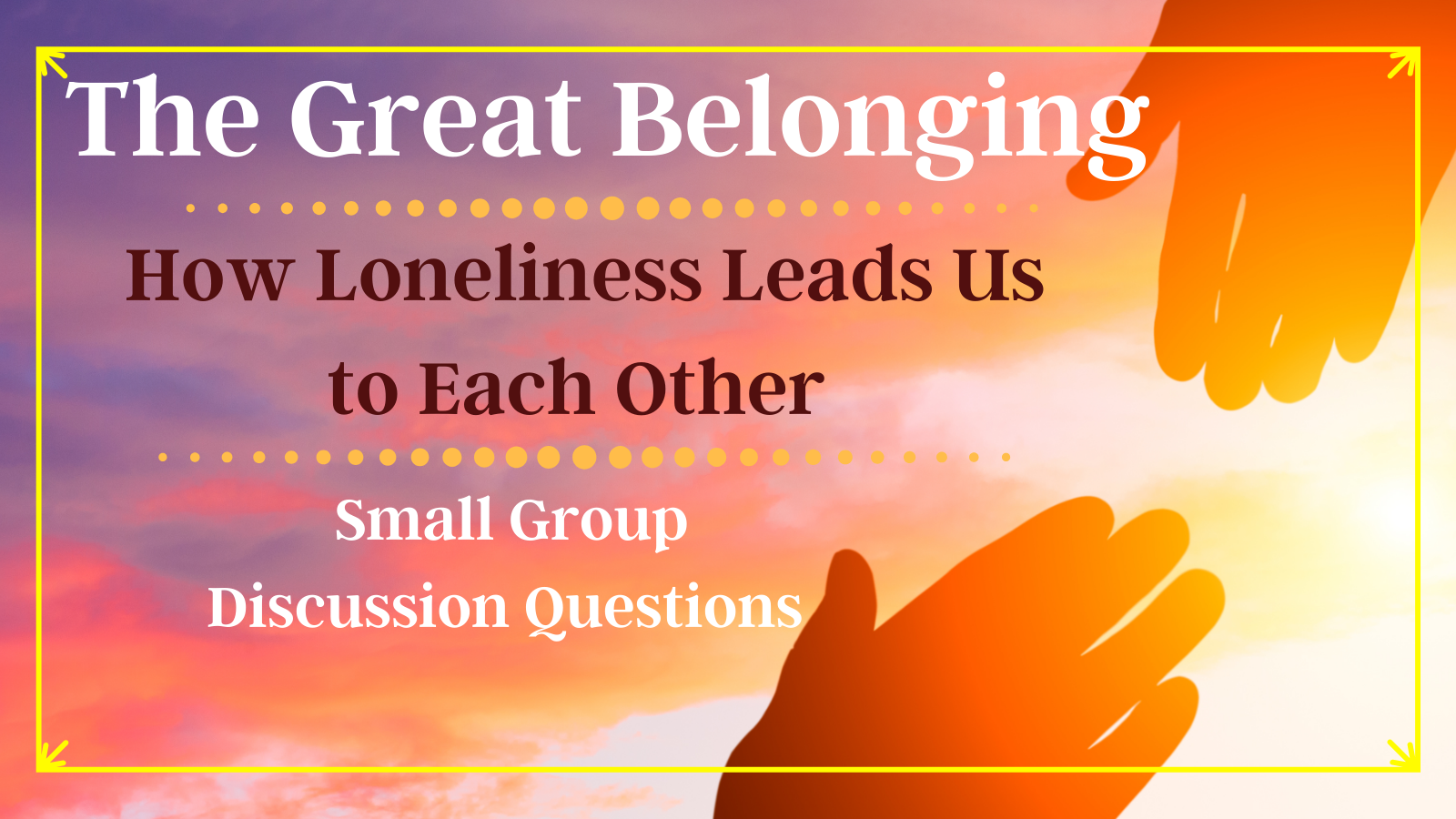Great Belonging Discussion Questions and Great Belonging Review written by the Hobbit on 5/31/22. This post contains affiliate links, you can find out more on our policies page or in the disclaimer at the bottom of the blog.
Know Before You Read
Book: The Great Belonging: How Loneliness Leads Us to Each Other
Author: Charlotte Donlon (forward Lauren Winner)
Genre: Non-fiction, Christian living, Personal growth
Pages: 192
Published: November 10th, 2020
Age Suggestion: 16+
Themes: grief, loneliness, friendship, faith, hope, Power of art, power of place
Warnings: This is a book for mature audiences and includes some discussion of marital sex. Not a major topic, and a simple discussion, but I would make sure any kids reading were mature.
Quick Summary of The Great Belonging
We all experience loneliness. What exactly is it? What are things that cause us to be lonely? Does being lonely means that something is wrong with us, or is it part of being human? How does faith fit into loneliness? Using multiple examples from her life, Donlon explores all of these to help us understand loneliness and move to a greater sense of belonging.
Great Belonging Review:
Donlon introduces us to loneliness being part of the human condition. We can never, regardless of our best efforts, really know ourselves or know others. We can seek to run away from loneliness, deny that it exists, but we all experience it. The only place we are fully known is in belonging to God – The “Great Belonging”. I find here some resonance with C.S. Lewis’s idea of Sehnsucht (a German noun translated as “longing” or “yearning”). She then looks and gives advice for each of these, plus an additional two:
- Belonging to Ourselves
- Belonging to Each Other
- Belonging to Our Places
- Belonging through Art
- Belonging to God
All of these intermingle her own story with examples of how loneliness affects us, and how we develop ways to help us cope with loneliness. Part one covers personal feelings; part two loneliness even in our closest relationships, such as marriage and parenting, and in other groups. I was particularly struck by the third and fourth parts, as these are subjects a lot of Christian writers, in particular, don’t cover. Place helps define who we are, and can be a powerful tool in belonging. And art (poetry, music, painting) often speaks to loneliness in ways that we don’t see in our too often art free churches.
She concludes with reminding us that we are known by God, and that we do have hope in this. “We are on this side of the-but-not-yet-reality of God’s kingdom, still suffering from the effects of sin and brokenness and pain. But the knowledge of what’s on the other side gives us hope.”
There are some general discussion questions, and a section of readings titled “Meditations for Belonging” that draws on a variety of good sources.
Continue reading for our Great Belonging Discussion Questions

–Why Read The Great Belonging–
The introduction is true. We ALL experience loneliness. Understanding that this is a normal part of being human is important, is a part of knowing what it is to be human, and Donlon helps us to see this and to see things that many things can contribute to loneliness for instance, (Chapter 6 is a list of multiple things – from waking up in a strange place to waking up in a familiar place-that can be occasions of loneliness). More importantly, she gives you tools to help with loneliness.
The book is written in 43 chapters. Most are short, leaving you time to think over each. Donlon does a great job of integrating her personal story into the themes. It is an open and honest discussion. So many books, especially those billed as Christian, are not. There is a feel of reality when you read this book.
Great Belonging Discussion Questions:
The book contains a general set of discussion questions. We have tried not to duplicate those.
Part One – Belonging to Ourselves
- Reflecting on Chapter Four, what is your earliest memory of loneliness?
- Chapter Nine is about pets and how they can help with feelings of loneliness. Have you ever had a pet of any type? How did that pet make you feel?
Part Two – Belonging to Each Other
- Chapter Fifteen is very relevant now. It discusses people’s satisfaction when around co-workers. Donlon suggests that the potential for interaction and connection gives hope. She suggests that churches and school are other places where this may happen. What are places you feel connected? How have the restrictions of 2020 affected those? What have or can you learn from this?
- In Chapter twenty-nine is about giving to others what we want most. What is it that you want most? Are there ways you can give that to others? How does this affect belonging?
Continue reading for more Great Belonging Discussion Questions

Parts Three and Four – Belonging to Our Places and Belong Through Art
- Donlon discusses several types of places. Are there places that you “belong to”? Has the mobility of our society affected our loneliness? What are ways we might counter this?
- Several types of art – music, poetry, stories, paintings – are mentioned. How does art show us what loneliness is? Is there one type of art that speaks more to you? How does it do that?
Part Six – Belonging to God
- What is your answer to the question in Chapter 42 – How can loneliness help us reflect, make changes, seek more, and make space for God?
- In Chapter forty-three Donlon says she is “a recipient of the grace of loneliness and the grace of belonging.” Read that chapter and put what she means into your own words.
Thanks for checking out our Great Belonging Discussion Questions and Review. Before you go, check out these other posts:
–Blue Parakeet: How we read the Bible affects our viewpoints
–The Chosen TV Series Review
–Overcomer and Breakthrough Small Group Discussion Questions
–I Still Believe Discussion Questions and Review
Down The Hobbit Hole Blog and this Great Belonging Discussion Questions and Great Belonging review uses affiliate links, we only link products we think you’ll like and you are never charged extra for them. As Amazon Associates, we earn from qualifying purchases at no additional cost to you. We also use cookies to gather analytics and present advertisements. This allows us to keep writing discussion questions and telling ridiculous dad jokes. Find our other reviews with discussion questions here. Our posts about faith here. And our posts about family stuff here.
